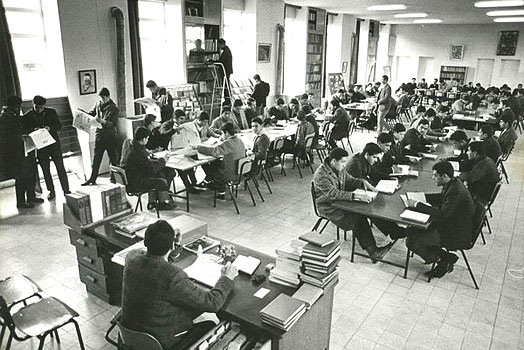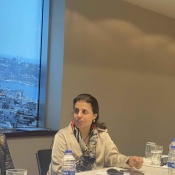Main Library Offers Long History of Impeccable Service
Birzeit University’s Main Library was established in 1924, evolving from what was then a school library into a university library at the former BZU campus. In 1985, the library moved to a new building donated by Alghanim Industries in Kuwait and was named the "Yusuf Ahmed Alghanim Library."
Presently, library holdings include 243,503 titles in 290,525 volumes, among them printed materials and non-print books, theses, journals, electronic databases and other materials. If one combines the holdings of the Main Library with those of the other three branch libraries (the Institute of Law Library, Women's Studies Institute Library and Development Studies Institute Library) the number of titles represented would approximate 350,000 volumes, mostly in English and Arabic, in addition to titles in French and German. The library has also served as a depository for UNESCO publications since 1979, and has been a regional depository center for World Bank publications since 2005. Moreover, the library is a technical support center for the computerized library system MINISIS.
Renowned Reputation & Exceptional Service
Library Director Diana Sayej Nasir says that the library earned its reputation from BZU’s status as a renowned seat of learning as well as the library’s exceptional services. The library provides services to Palestinian institutions, ministries, local government bodies, municipalities, school and university students, as well as independent researchers and other community groups. It also offers online services through its website.
BZU’s Main Library was the first to introduce advanced technology by subscribing to critical databases in 2006, making them available to users and computerizing the library system in 1985.
“We were a model for other universities when they established their libraries,” says Nasir, “and offered consultations with local libraries, most recently a consultation with the Mental Health library at the Ministry of Health.”
Effective External Relations & Awards for Quality
In 2011 and 2012, BZU’s Main Library achieved two accomplishments: its online catalog was adopted as one of the online catalogs provided to international libraries through the Web Classification service by the US Library of Congress, and the library became a member of the Unified Arab Catalog.
At the General Assembly of Electronic Information for Libraries coordinators, held in Sofia, Bulgaria in early November 2008, BZU’s library director was elected as the first Arab member of the advisory board.
Furthermore, BZU’s Main Library has developed gift and exchange relations with many libraries abroad, among them the Library of Congress in Washington, DC, Yarmouk University in Irbid, Jordan, the University of Jordan in Amman, Jordan, the Institute for Palestine Studies in Beirut, Lebanon, Abdel Hamid Shoman Library in Amman, Jordan, the Center for Strategic Studies and Research in Dubai, UAE and many other local libraries.
Services for Students with Special Needs
BZU’s Main Library works to serve students with special needs alongside the overall community. The library provides Brill textbooks for students with visual disabilities and a special room furnished with equipment needed for those students to access academic resources.
The library has also made available 535 textbooks for 47 different courses, so that students who cannot afford to purchase them can borrow the textbooks and return them upon course completion. This initiative was the result of a generous donation from the Friends of Birzeit and the Heritage Revival Center in Amman.
Library Staff
The Main Library staff numbers 26 male and female employees distributed over three main sections, their credentials including degrees in library science and extensive experience with the library’s holdings. The library management is continuously seeking to develop its cadre and enrich their experiences through internships and international training opportunities.
Grand Ambitions Face Great Challenges
Despite these accomplishments, the library encounters challenges, among them the financial crises affecting the entire university, requiring the library to make budget cuts in 2011-12. Nasir says that these budget cuts came at the expense of library services and acquisitions. "We need to hire new employees, especially after the resignation of an employee, retirement of another and death of the third,” she says.
The library seeks to increase its budget to overcome these challenges while introducing new services to continue to lead in the digital age. Also, the library aspires to spread awareness of informatics to encourage teachers to urge their students to move towards scientific research.
Knowledge gained through information is a critical service for any institution of higher learning, and BZU’s library seeks to remain at the vanguard of this task.







